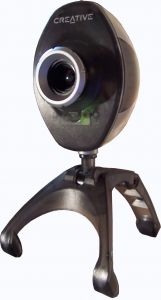Study: GNU/Linux Users Less Sympathetic Towards Apple

Cory Doctorow, a GNU/Linux user, is a very prominent
critic of the Apple hypePad
Summary: Analysis or a survey shows that among people who are conscious of freedom Apple is very much distrusted
THANKS to all those who participated/contributed to the discussion about Apple. There is an analogous discussion at Groklaw and someone brought up the new study which claims you may have to be a GNU/Linux user to actually dislike the hypePad (or at least increase the probability of that). IDG now has an article about it and it’s titled “Linux lovers more likely to loathe the iPad” (that ought to be taken as a compliment).
iPad owners tend to put business before pleasure, while critics of the device fit the classic geek stereotype, says a new study
hypePad is dangerous to our digital freedom not just because it gives power to Apple. hypePad actually challenges existing business models and makes them increasingly hostile.
“hypePad actually challenges existing business models and makes them increasingly hostile.”For what it’s worth, I can understand some hostility towards my stance in Groklaw. Not many of the readers of Groklaw are GNU/Linux proponents. Many of them are just legal professionals and Pamela Jones too used to reply to me from a mail client on a Mac OS X, so I presume she is not opposed to buying from Apple. We are not here to criticise but only to explain one point of view, which the FSF happened to agree with. Personally I agree with almost everything that Groklaw and the FSF say, but there are exceptions. █
“FSF did some anti-Apple campaigns too. Personally I worry more about Apple because they have user loyalty; Microsoft doesn’t.”
–Bradley M. Kuhn (SFLC)
Windows Trojans and Potential for Paedophilia
Summary: Microsoft’s insecure-by-design products allow the camera to be remotely activated for spying
IF YOUR CHILD uses Windows, be aware of the risk. “Our products just aren’t engineered for security,” Microsoft’s Brian Valentine famously stated. From the German news:
Hacker arrested for spying on schoolgirls via their own webcams
[...]
Two girls told him the little lights on their webcams were not going out when they had finished using them. On examining one of the computers Floß discovered a so-called Trojan computer program which was being used to control the equipment, and which had been spread via the chat service ICQ.
Acquiring anti-virus software is in its own right a risk, based on the news. [via]
The documents list the amounts charged to more than 2,000 people around the world (the screen shots show the distribution of victims globally and in the United States). Victims paid anywhere from $50 to $100 for the fake anti-virus software. The file lists the amounts charged, partially obscured credit card numbers, and the names, addresses and e-mails of all victims.
Windows is very good… for the bad guys. Don’t expect the press to blame Windows though; Waggener Edstrom is agitating/harassing journalists who do so. █
“All in all, Waggener Edstrom would have twenty months to lather up the press.”
–Barbarians Led by Bill Gates, a book composed
by the daughter of Microsoft’s Pam Edstrom
To Microsoft, Silverlight is Not Moonlight and the World is x86 Binary
Summary: A look at Microsoft’s very narrow world view when it comes to the Web
THE Mono-based Moonlight is a menace for many reasons. Even the FSF recognises this. A reader has sent us the following screenshot this morning. It helps show that in Microsoft’s eyes there is only one acceptable architecture and only two platforms worthy of being served on the World Wide Web (both are proprietary).
Last year it turned out that Moblin would get Silverlight, but there is no Moblin anymore. It’s merged with Maemo now and it’s called MeeGo. So what’s up with that? In any event, watch out for Mono traps which are still being promoted in Web sites like OMG! Ubuntu without discretion. Docky is Mono-based, just like Moonlight. █
‘Harmonisation’ Tricks Down Under; TechInsights Explains How to ‘Cheat’ and Patent Software
Summary: South Pacific patent laws and how loopholes are made to allow software patents through “physical” appendages or “transformations”
OVER in Australia it oughtn’t be hard to patent software, but Australia is one of the very few countries which permit monopolising algorithms. Based on Patent Baristas, “Australian Patent Office Refines Test for Patentability of Business Methods” and this applies to software too:
Prior to the subject decision, the governing precedent was Grant v Commissioner of Patents [2006] FCAFC 120 (“Grant”). Grant stood for the proposition that a method must produce “a physical effect in the sense of a concrete effect or phenomenon or manifestation or transformation”. Grant went on to say that a change in the state or memory of a computer may be a “physical effect”.
Patentors of software can use the “embedded” trick in New Zealand following some changes which were not exactly ideal, but there are still claims of disparity between Australian and Kiwi patent laws.
Australia and New Zealand may be close geographically and culturally, but when it comes to patent protection, their paths have started to diverge. When talking to clients, whether in Australia or elsewhere, I usually mention the possibility that they could also pursue patent protection in New Zealand. In those discussions, it often becomes clear that the client assumes the patent provisions of the two countries are, by and large, synonymous. This is not so. While harmonisation of the IP laws of these South Pacific cousins continues to be the subject of much discussion on both sides of the Tasman, the reality of achieving this seems (sadly) increasingly unlikely in the context of recent developments.
Notice the use of the word “harmonisation”; in such cases, the more dominant force usually imposes its laws upon the subordinate one. This trick was being called the same thing — namely “harmonisation” — when American software patents lobbyists were trying to legalise software patents in Europe [1, 2].
One post-Bilski analysis that we missed last month came from TechInsights and it helped explain the tricks for patenting software. To quote the opening:
For over a decade the fundamental intellectual property rights of an innovation implemented in software have been held ransom as the appeals on the case, “Bilski et al. v. Kappos …” worked their way through the system to the Supreme Court. Prior to the Supreme Court’s recent ruling, software and process patents were on very shaky ground due to the assertion by a lower court that a claimed process is only patent-eligible if it is tied to a particular machine or apparatus, or it transforms a particular article into a different state or thing.
The Supreme Court’s June 28th, 2010, decision on the Bilski case was an affirmation of the viability of patent protection for innovation implemented in software. However, uncertainty still exists as a clear test for patentable subject matter was not established. The Bilski patent was found to claim an abstract idea and as such was determined not to be patentable. Demonstrating the tangible nature of a patented innovation will likely be a key to successfully defending patent rights in the software space.
It sure seems like these tests for physical attributes and transformation are what eventually defines/determines many countries’ policy on patents. As such (pun intended), policy regarding software patents is not a binary condition and it’s important to recognise the familiar loopholes which are used to permit software patents. █
IBM Brags About Software Patents, Just Like Novell
Summary: IBM is a proponent of software patents and it is very proud of its practice of patenting the equivalent of mathematics
EARLIER this year Novell bragged about its number of software patents. It claimed the #1 position based on one criterion and IBM — a proponent of software patents — does so too. IBM has an addiction (to patents) and it is not a healthy one. Steve Mills equates patents with invention when he says:
No company has more software patents than we do, so we are the most prolific company in the world in terms of software invention.
Wow. Everyone must be impressed because IBM has many monopolies on algorithms. What do these monopolies mean to software start-ups? According to Pamela Samuelson and a colleague, patents are hardly valuable to start-ups. Patents are a “big boys’ game” (not actual quote) for players like IBM, Microsoft, Nokia, and so forth. Here is what Feld, a venture capitalist, had to say about the study from Samuelson et al.
I was appalled when I started seeing soundbites emerge from at least one of the authors of the paper from weak conclusions buried in the midst of the data. My partner Jason took one of them on when he wrote his post 76% of Venture Capitalists Believe that Software Patents are Important (NOT!) In this post I think Jason does an excellent job of dissecting the data and explaining why this is not only an incorrect conclusion from the data, but a terribly misleading soundbite.
In other news, giant Rambus continues to terrify and to extort the entire industry with patent submarines.
Rambus, a designer of semiconductor chips, won a long-running patent battle with NVIDIA, but that dispute is not the only one the company is involved in – and the upcoming decisions could mean millions in additional revenue.
This week the barring the U.S. International Trade Commission ruled that NVIDIA was violating Rambus’ patents for certain kinds of memory controllers. NVIDIA must now come to some agreement with Rambus to pay license fees. If it does not, then the company’s products cannot be imported into the United States.
Rambus is an excellent example of why the patent system is anything but excellent. IBM too could become more like Rambus one day, assuming it has no other sources of revenue (to an extent, IBM already milks the competition’s cows, unless it’s Free/libre). Microsoft has already turned into a patent bully because many of its products fail, so it chooses to rely on royalties (i.e. taxing the competition). █
After AstroTurfing, Microsoft Complains About Monopoly
Summary: After the LawMedia AstroTurf (against Google) those same old talking points are returning
FOR THOSE WHO cannot remember or do not know, Microsoft hired a bunch of AstroTurfers to wash the Web (and other means of communication) with talking points about a Yahoo-Google deal being a threat. That’s just Microsoft’s modus operandi and it’s the reason this monopolist is loathed by so many. Watch what Microsoft is doing at this moment:
Yahoo!-Google deal in Japan is anti-competitive, says Microsoft. “This deal gives Google virtually 100 percent of all searches in Japan, both paid and unpaid.” Brad Smith, Microsoft’s general counsel, said in a statement.
He also refers to the expected 2008 Yahoo! Google deal which was scraped owing to anti-competitive fears.
I wonder what Microsoft thinks of its own monopoly in the PC segment where the company has exclusive deals with all major PC vendors to pre-install Windows.
We haven’t kept track of Microsoft news since the beginning of the month, but hopefully we’ll return to this later and provide more details. █
Novell Appoints Leading Member of the KDE Marketing Team as OpenSUSE Community Manager
Summary: A prominent member of the KDE project is picked by Novell to serve as a promoter of OpenSUSE
A FEW HOURS AGO we wrote about OpenSUSE, noting that it ought to find new stewardship. In addition to covering some recent OpenSUSE news [1, 2], Muktware writes about Novell’s announcement that Jos Poortvliet is becoming the Community Manager of OpenSUSE:
The openSUSE Project has announced the appointment of Jos Poortvliet as openSUSE Community Manager starting August 1.
Poortvliet brings several years of community building experience to his new role and will be responsible for continuing to drive and grow the openSUSE project as well as serve as community liaison within Novell.
Zonker, who is the previous Community Manager, left Novell several months ago, so it took OpenSUSE a lot time to make this appointment. It took about half a year and Andreas Jaeger announced this in the mailing lists as follows:
We’re proud to announce today that Jos Poortvliet will join the openSUSE project and Novell as openSUSE Community Manager starting on August 1. With Jos we’ve found a leader with excellent community building experience combined with a very welcoming nature, many fresh, promising ideas and a strong drive to grow the openSUSE Project. Jos holds a degree in Organisational Psychology from the University of Utrecht and has gained valuable experience in several professional roles ranging from Project Manager at KPN to Service Level Manager at Royal Bank of Scotland. Last but not least, Jos is a leading member of the KDE Marketing Team and has helped Akademy and the Gran Canaria Desktop Summit attract a vibrant and collaborative audience.
Jos commented, “The opportunity to become part of the international openSUSE community is very exciting. There are a great number of interesting developments going on in the free software world, and openSUSE plays a major role in many of them. I look forward to working with the community on these, helping it grow, finding new directions and ways of developing, and delivering its innovative technologies to users and developers around the world.”
We enthusiastically welcome Jos and look forward to his working with the openSUSE community to shape the future of the openSUSE project. After his start he will be deeply involved in the openSUSE conference, other community events and activities, and of course he will have the pleasure of promoting openSUSE wherever possible.
Andreas
Poortvliet will be managing a strong KDE-oriented (but pro-DE choice) GNU/Linux distribution. It is mostly a representative role as people like Andreas, Coolo, and their colleagues coordinate development.
I generally like Poortvliet. He has been politely asking me in Identi.ca to go easy on Novell and SUSE (since approximately 2 months ago). █























 Content is available under CC-BY-SA
Content is available under CC-BY-SA